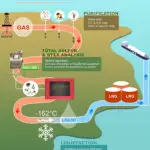
The project would produce 3-4 million gallons of LNG, 365 days per year. This quantity can fill 300-400 tanker trucks or 100 (30,000 gal) cryogenic rail cars per day. The hazardous, flammable LNG would be moved overland (rail or road) approximately 200 miles through 13 Pennsylvania Counties to a port in Gibbstown, NJ, where an entity related to New Fortress Energy plans to build a deepwater port. From the port, the LNG would be shipped overseas. This project is NOT about U.S. “energy independence.” LNG exports are solely for the profits of investors. For more information, click here.
The Beaver County cracker plant takes ethane, a component of Marcellus Shale natural gas obtained from fracking, and “cracks” it into ethylene. The ethylene is then used to make plastic “nurdles”, small plastic pellets, which are made into other plastic products when other chemicals are added. The cracker plant has had multiple violations in its short history. Learn more here.
In 2008, the Environmental Issues Committee saw a need to educate themselves about the new Marcellus Shale industry coming to Indiana County. As it became clear that the new technology affected Pennsylvania’s water, air, infrastructure, agriculture, forests, tourism, and economy, a study of the drilling process and its impacts was timely.
After identifying the issue, Indiana County League brought it to the attention of Leagues across PA. To do a formal study the local league made a proposal to the LWV PA at the state convention. the following was presented:
The state convention accepted the proposal and the Indiana County LWV Environmental Issues Committee went to work to develop a series of five study guides between 2009 and 2010. The Guides were:
In June 2009, the completed guides were distributed to all the local PA Leagues. Twenty-six leagues took up the challenge, organizing study groups, sponsoring public forums with experts representing various viewpoints, visited drilling sites, and participating in webinars and other presentations at various colleges and universities. Ultimately, over 350 people participated in the consensus process which arrived at a position to accept fracking but recommended instituting maximum precautions to protect the health of residents and workers.
Because shale gas extraction was a new technology, research was constantly developing. As a result, the Indiana County Environmental Issues Committee wrote addenda for each of the Study Guides with current and new information This was particularly true in the health field where new information emerged over time. Because of the emerging information on Health a new Guide, Shale Gas Extraction and Public Health, was written and adopted by the “Straight Scoop on Shale” and continues to be updated and reprinted.
The League of Women Voters, a nonpartisan political organization, encourages informed and active participation in government, works to increase understanding of major public policy issues, and influences public policy through education and advocacy.
The LWVIC Environmental Issues Committee, sponsored by the LWVPA Citizen Education Fund, wrote “The Straight Scoop on Shale Drilling” in 2011, which was subsequently adopted by LWVPA and LWVUS. Its purpose is to educate and engage the public regarding natural gas extraction from Marcellus Shale, its impact on our water and communities, and how government is involved through permitting, taxation and regulation. As part of this commitment, The Straight Scoop on Shale Drilling organizes an annual conference “Shale & Public Health” featuring a large variety of experts speaking to topics related to shale drilling.
To further educate the public about environmental topics, The Straight Scoop on Shale Drilling supports other organizations by promoting their events. To learn more, click here.
In 2023 the Shale and Public Health Conference took place in Pittsburgh on November 14 and was also offered virtually. As usual, it was a very successful conference with topics including birth impacts, radiation and waste, fracking and water contaminants, abandoned wells, PFAS, and a panel discussion on Blue Hydrogen. For videos of the talks from the 2023 Conference, click here.
This annual event is free and open to the public.
